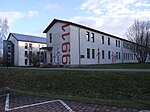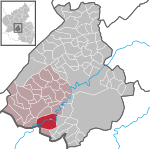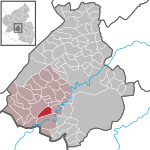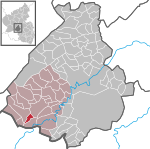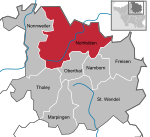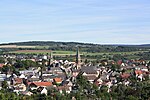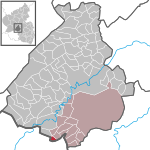Neubrücke (Nahe) station
Buildings and structures in Birkenfeld (district)Railway stations in Germany opened in 1860Railway stations in Rhineland-Palatinate

Neubrücke (Nahe) station is a station in the town of Neubrücke (Nahe) in the municipality of Hoppstädten-Weiersbach in the German state of Rhineland-Palatinate. It is on the Nahe Valley Railway (Nahetalbahn) and was the terminus of the Birkenfeld District Railway (Birkenfelder Kreisbahn) to the district seat of Birkenfeld from 1880 to 1991. It was opened with the extension of the Nahe Valley Railway from Idar-Oberstein to Neunkirchen (Saar) on 26 May 1860.
Excerpt from the Wikipedia article Neubrücke (Nahe) station (License: CC BY-SA 3.0, Authors, Images).Neubrücke (Nahe) station
Birkenfeld
Geographical coordinates (GPS) Address Nearby Places Show on map
Geographical coordinates (GPS)
| Latitude | Longitude |
|---|---|
| N 49.605559 ° | E 7.169979 ° |
Address
55768 Birkenfeld, Neubrücke
Rhineland-Palatinate, Germany
Open on Google Maps
